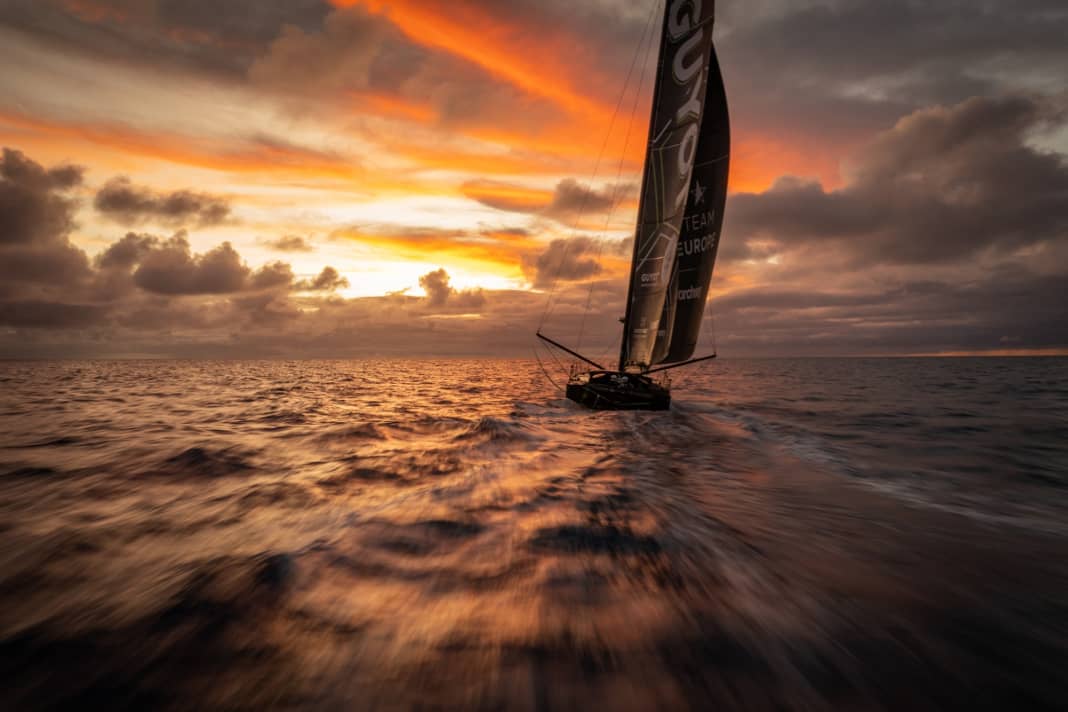





After a weak windy weekend, the four Imocas in the Ocean Race in the southern latitudes of the Pacific Ocean are finally making some headway again. This was especially true for Team Malizia on the morning of 21 March. The crew led by Boris Herrmann had taken the lead the previous evening. It was the 13th change of lead in just two days. This has never happened before in an Ocean Race on the ice edge of the Southern Ocean.
Boris Herrmann: "As tight as after the start of a harbour race!"
Boris Herrmann commented on the exciting battle for the best result on the course for Cape Horn: "After 8,000 nautical miles, we are closer together than 45 minutes after the start of a harbour race." On Tuesday morning, the teams sailed eastwards at around the 49th parallel south at speeds of 15 to 20 knots. Only Team Holcim - PRB was in third position behind Team 11th Hour Racing, travelling a little further south. Team Malizia had recently achieved an average speed of just over 18 knots over 24 hours. Still only 4.9 nautical miles for the entire fleet!
Before Team Malizia, Kevin Escoffier's Team Holcim - PRB had been in the lead again for a while. He explained why it didn't last: "We're pretty fast. I think when we are close to the other boats, the speed is fine. But every time we get fast and pull away from the others, they come back with wind from behind."
Justine Mettraux: "It will be a complete restart"
The close-knit nature of the competition also helps the crews to study and optimise their own configurations. Tam Malizia's navigator Nico Lunven said: "The fleet is so close together that we can keep a close eye on the other boats to see whether we are sailing faster or slower, higher or lower than the others." The Swiss Justine Mettraux from Team 11th Hour Racing summarised the situation as follows: "It's like a complete restart. It will be interesting. A lot will be at stake over the next few days."
Their skipper Charlie Enright described the current scenario at the start of the fourth week at sea as "crazy". "Despite the fact that these boats are here (alongside us), we are just trying to race our race and not change our philosophy. We still have quite a bit of the race ahead of us. Especially for Cape Horn we know there will be tough conditions. So we really want to keep the boat in one piece. Then we'll see what happens."
Very strong westerly winds expected for the Cape Horn Passage
The long-term forecast calls for more typical Southern Ocean conditions for the approach to Cape Horn next weekend than have prevailed in recent days. The fleet will come quite close to the legendary landmark, as the race organisers have raised the ice limit far to the north due to unusually northern ice sightings. Nevertheless, the Cape Horn Passage will force the fleet to drop as much as 57 degrees to the south.
The latest forecasts predict very strong westerly winds and an accompanying swell of over six metres for the "summit storm" of the mammoth stage. Cape Horn could once again prove to be a tough test for boats and teams with 10,000 nautical miles already in their hulls and bodies. Once Cape Horn has been mastered, the teams will turn left and head for Itajaí in Brazil.
Phillip Kasüske: "I slept 16 hours on my day off"
Life at sea is very different for Team Guyot Environnement - Team Europe. Phillip Kasüske from Berlin is part of the transfer crew on the course from Cape Town to Itajaí. Following the successful repair of the hull damage, the team is heading west to the next port of call, where they intend to rejoin the Ocean Race for leg four.
On board "Guyot", the five crew members sometimes have a whole day off. Phillip Kasüske explains: "In a few hours, Seb (editor: navigator Sébastien Simon, who is acting as skipper on the transfer) will have a day off. That means a day's holiday for him. He doesn't have to be on watch. I slept most of the time on my day off. I think I slept for 16 hours. I was super tired when I got here just before the transfer started and went straight into the guard system. Now my batteries are fully recharged. I'm already looking forward to my next holiday in three days' time."
Team Guyot: re-entry into the Ocean Race for leg 4
The Guyot team makes the best of their situation. Sébastien Simon, Phillip Kasüske, technicians Jimmy Le Baut, Clovis Gautier and on-board reporter Charles Drapeau are pushing their boat as fast as possible in order to maximise their preparation time in Itajaí for leg four, which starts on 23 April. The 5,550 nautical mile leg to Newport in the USA then lies ahead of them.
Caught up and overtaken: Team Holcim - PRB already had a 600 nautical mile lead on the royal stage. Although the opponents had to put up with a whole series of technical setbacks, the field is now as close together again as it was after the start:
At this point, you will find external content that complements the article. You can display and hide it with a click.

